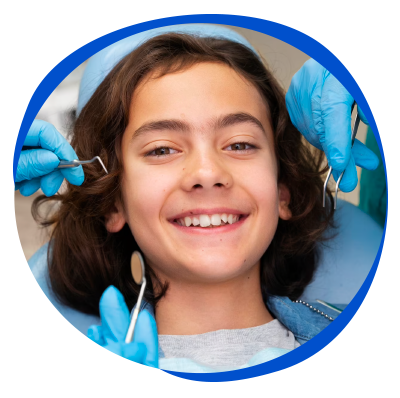Book an Appointment WithExpert Pediatric Dentist




Our team of trained Pediatric Dentists are dedicated to restoring the oral health of your children. They shape children’s behaviour using various behaviour modification strategies and pharmacological aids. Apart from treating the existing dental problem, they strive to help our patients avoid future dental troubles.


Pediatric dentists provide oral health care to children from infancy through the teen years. Being an age-specific specialty, pediatric dentistry includes behaviour guidance, supervision of orofacial growth and development, caries prevention and risk assessment, care of special health care needs patients, pharmacological management, including sedation, and hospital dentistry, as well as other traditional fields of dentistry. A pediatric dentist caters to the dental needs of children throughout their ever-changing stages of development and treats conditions and diseases unique to growing individuals.
Ideally, a child should visit a dentist as soon as his or her first tooth erupts (usually around 6 months of age). The American Academy of Pediatric Dentistry (AAPD) recommends that a child go to the dentist no later than his or her first birthday or within six months after the first tooth erupts.
Children generally begin to get their baby teeth at around 6 months of age. However, they may appear as early as 4 months of age or as late as 15 months. By around 3 years of age, all 20 baby teeth would have erupted.
Baby teeth typically begin to loosen and fall out to make room for permanent teeth at about 6 years of age. By around 12 years of age, all baby teeth have shed and are replaced by permanent teeth. All 32 of the permanent teeth usually erupt by the age of 21.
Starting at birth, clean your child’s gums with a soft cloth and water. Use a soft toothbrush and water as soon as the first tooth erupts. Parents should use a tiny smear of fluoride toothpaste to brush baby teeth twice daily from around 18 months of age. The amount of toothpaste should be increased to a pea-sized dollop at 3 years of age. Children require supervised brushing until they are 8 years old.
The size of the toothbrush head and its bristle type are more important factors to consider than the brand of the toothbrush. We recommend using a soft toothbrush with a small head as it is less likely to cause gum injuries and also reaches the back areas of the mouth more effectively, thus providing a thorough cleaning. Replace toothbrushes every three to four months or as soon as the bristles are worn out or if your child has been sick. Make sure your child uses a fluoride-containing toothpaste, as it helps prevent dental decay.
Brushing technique is suggested according to the child’s age. For young children, clean 2–3 teeth at a time using circular motions. Do not forget to brush the inner surfaces of the teeth. Use the Two-by-Two rule – brush twice a day for two minutes. Refer to our blog for more elaborate details.
X-rays are a valuable diagnostic tool in dentistry and play an important role in forming the treatment plan. With our modern X-ray units, which have exposure settings designed differently for adults and children, we are able to limit the X-ray exposure to follow the ALARA (as low as reasonably achievable) principle. We use high-speed films and digital X-rays to ensure safety and minimize the amount of radiation.
A dental sealant is a thin, protective plastic coating usually placed on the chewing surfaces of back teeth. Sealants protect these vulnerable sites from bacterial attack by preventing food lodgement, thus preventing dental caries. We can decide which teeth need to receive a sealant application based on your child’s caries risk status.

